Mining graduates should utilise acquired skills

Mining graduates should not be myopic waiting to secure employment but need to leverage on their acquired skills and knowledge to set up own enterprises, an official has said.
Benard Rinomhota
In recent years, tertiary institutions across the country have continued churning out thousands of graduates from different disciplines but have failed to secure employment.
This has been attributed to the high unemployment rate engendered by the obtaining adverse economic climate where companies across the board have either scaled down or shut down operations.
In the context of the depressed labour market, chairperson of the Institute of Mining Research at the University of Zimbabwe, Professor Layman Mlambo said:
“Unemployment is the more reason why mining students should take their college field works and industrial attachments seriously.
“During these activities, they should identify practical things, small or big, they can later do as entrepreneurs.”
He said mining graduates must realise that when they look for employment their opportunities are narrowed to the specific sub-branches studied as individuals.
On the contrary, Prof Mlambo said venturing into entrepreneurship offers accretive opportunities to all fields in the mining sector.
“In entrepreneurship opportunities are broadened to all fields in the sector (the whole mineral value chain), by pooling together their skills,” he said.
He said given that capital is a setback hampering most entrepreneurial projects, mining graduates needed to identify opportunities in which the greatest capital is knowledge and any necessary equipment can be hired using pooled resources.
“Starting small is also strategic in this case. In principle, mining graduates can go into exploration business, consultancy, mining, and buying and selling of minerals,” said Prof Mlambo.
He said mining graduates can form exploration companies in which they produce judiciously and completely evaluated mining assets or projects for sale.
Prof Mlambo added:
“An area that requires little capital is consultancy, where the only or main requirements are brains and a computer.
“Some consultancy contracts are completely Internet-based in terms of their signing and delivery of services (without having to meet physically with clients).
“Frequent access and maximum productive use of the Internet cannot be overemphasized in broadening opportunities and capacities to deliver.”
Examples of specific areas of consultancy include environmental impact assessments, complete economic feasibility studies, geological reports, and mine planning and designs.
He said some consultancy can be done either as innovative services or responsive services and the former is based on knowledge gaps in the market identified by the consultants themselves, who then proactively develop and market knowledge products to relevant clients.
“Responsive services are based on active market demand or calls and both services can be pursued concomitantly.”
Mining graduates, Prof Mlambo noted that may form mining syndicates, acquire claims and undertake mining at a small scale for a start. “Exploitation of surface deposits and dumps, and use of custom millers or elution plants could be low-cost starts.
“With verifiable evaluated assets, they can seek financial partners or small loans from banks.
“Government’s efforts to formalise the artisanal and small-scale mining sector can never meet with greater necessity than this entrance of mining graduates into the sector,” he said, adding that mining graduates can also form buying and selling syndicates.
The mining sector is one of Zimbabwe’s economic mainstays contributing 70 per cent to the country’s export earnings.
This article first appeared in the Mining Zimbabwe July 2020 Issue


